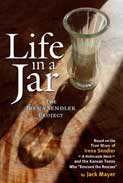 |
Life in a Jar:
The Irena Sendler Project by Jack Mayer Long Trail Press
book review by Karyn Saemann
"Mr. Rosner looked one last time into his son's face. His trembling finger touched Isek's sunken cheek, circled his forehead, around sleeping eyes... He held Isek out to Irena and turned away so she would not see his tears."
Once resurrected, Irena Sendler's story quickly drew international notice, earning the World War II Polish Catholic social worker a Nobel Peace Prize nomination. But back in 1999, when three Kansas teens penned a play about her for a history project, Sendler's efforts to smuggle Jewish children out of the notorious Warsaw ghetto appeared all but forgotten. Writing with great clarity and allowing the tale's inherent drama to unfold unforced, Mayer divides the book into three parts: the origins of the "Life in a Jar" play; the excruciating details of what occurred in Warsaw from 1939 to 1944; and meetings, in Poland, of Sendler and the teenage playwrights before her death in 2008. The facts are haunting. Sendler and others knocked on doors, convincing doomed Jewish parents to hand over 2,500 babies and children who were carried out in boxes, sedated and laid atop morgue wagons and led through back alleys and sewers to Christian safe homes outside the ghetto. Hoping the children might later find their families and would know they were Jewish, Sendler wrote their Jewish and new Christian names on paper slips and buried them in glass jars in a friend's backyard. Ultimately, Sendler was imprisoned for aiding Jews, but lived.
Mayer calls his a work of creative non-fiction with imagined dialogue based on extensive interviews. The novel-like feel works marvelously, lending crucial humanity. The discussion of why heroism like Sendler's went unrecognized in postwar Communist Poland is delicately addressed. Just as gently, Mayer explores how the country is now talking about the war, and how Life in a Jar helped open that painful dialogue. A beautiful story, beautifully told... at last.
